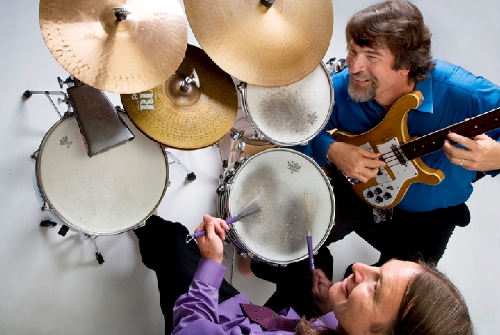Sons of legendary jazzman Dave Brubeck bring their quartet to Las Vegas

Forgive the biblical riff, but we must inquire:
Shall the songs of the father be visited upon his sons?
"There’s an arc of a little bit of running away from it at first with my own rock ‘n’ roll things, then having proved we didn’t need to do it, then, ‘OK, let’s salute him’ — I’m immensely proud of my father and his musical legacy," Chris Brubeck says.
"We’re not a Dave Brubeck clone band," Dan Brubeck says. "When people walk away from our concerts, they’re happy they’re not hearing something like what Dave played 40 years ago. They’re hearing something freshened up and stylistically changed. Dave listened to it, and he was totally digging it."
Legend: Dave Brubeck, age 90, jazz pianist, pioneer and Kennedy Center honoree. His quartet’s groundbreaking "Take Five" topped a National Public Radio poll as the greatest jazz song of all time and is the best-selling jazz single ever.
Legacy: Six children, four of them musicians, two of them — multi-instrumentalist/composer Chris and percussionist Dan, both highly accomplished not only in jazz but in rock, classical, folk and funk — bringing their Brubeck Brothers Quartet (aka, BBQ) to downtown’s Historic Fifth Street School for a jazzy evening Saturday.
Here, in separate interviews, the siblings discuss their father — whom they call, simply, "Dave" — growing up Brubeck and their own musical agendas:
Question: Your dad still plays occasional concerts, including with you. How’s he doing at 90?
Chris: Pretty good. He’s not in perfect health, but most people aren’t at 90. We’re trying to get him to wind down and keep everything within drivability from his house in Connecticut. Out of around 5,000 concerts he’s played, maybe he missed one. No matter how sick you get, he always said that if you could possibly get onstage, your adrenaline gets going and there’s this amazing healing thing you get from the audience.
Dan: He’s been on the road quite a bit and played the Blue Note not that long ago. Last year, I started to see the brakes go a little. If he could, he would still work all the time. And he’s writing new jazz pieces and classical pieces all the time.
Q: What was it like being around great jazz musicians while growing up, like Dave’s original quartet partners (drummer Joe Morello, saxophonist Paul Desmond and bassist Eugene Wright)?
Dan: I studied Joe Morello, he was my first big inspiration. It was a festive thing. People would be creative in our living room, like "Let’s try this!" This creative energy being thrown around and kids love that, like, "Give us the paint! We’ll throw it around and see what happens!"
Q: Did you feel pressured to follow in your dad’s jazz footsteps rather than carve out your own musical identities?
Chris: We grew up loving and playing jazz, but also loving and playing rock, the Beatles, hearing reggae, R&B and funk. I started as a rock ‘n’ roll guy who grew up in a jazz house, then crossed into the jazz world. We just played the Tucson Jazz Society, and the president said he was thrilled because we totally know straightahead jazz, but sometimes he gets tired of people rehashing that. We bring an influence that updates it. We’re doing very creative versions of Dave’s material such as "Take Five" and "Blue Rondo a la Turk" and "Kathy’s Waltz," which actually starts out as a reggae tune. We’re not re-creationists.
Dan: We have all these influences, and we’re not afraid to use them. It might be harder for someone else to play Dave’s music and change it that much. We feel like we have the right to move it around without ruffling any feathers.
Q: Chris, you’re a quadruple threat as a composer, classical orchestral arranger, lyricist and performer whom Chicago Tribune critic John von Rhein called "a 21st-century Leonard Bernstein." Safe to say it’s flattering?
Chris: I saw that and went, "Whoa! I’d better grab that quote!" And I don’t even know the guy. He must’ve been in a good mood when he heard the music. Historically, it’s very significant because my father collaborated with Leonard Bernstein in the first explorations of classical music blending with jazz. That’s the way I grew up, so it’s natural for me to extend my musical language into the world of orchestras.
Q: Dan, drummers don’t often get pushed to the forefront of musical stardom, as happened with your father and Chris. Have you ever felt left in the shadows?
Dan: Early on I felt that. Nowadays there’s a new breed of drummer who’s learned harmony and writing. I didn’t put enough energy into that. To be a leader and gain respect, you have to be a good writer and play piano pretty well. It makes you a better drummer if you really understand what’s going on around you, and I think the younger guys are grasping that.
Q: Do you feel a sort of responsibility to keep your father’s legacy going through your own music?
Chris: It wasn’t a conscious thing like a coat of arms and a shield, but it certainly appealed to me. In the ’70s, we’d go to colleges and Dave’s group would be there and my brother’s jazz group and my rock group. Someone said, "Hey, as long as you’re all there, Dave, why don’t you play with your sons?" We did, and the audience reaction was supercharged. In Europe they went especially nuts. How many fathers have this fantasy of wishing they could make music with their kids?
Contact reporter Steve Bornfeld at sbornfeld@ reviewjournal.com or 702-383-0256.
PreviewBrubeck Brothers Quartet
8 p.m. Saturday
Historic Fifth Street School, 401 S. Fourth St.
$10 in advance, $15 on Saturday (229-3515;
www.artslasvegas.org)












